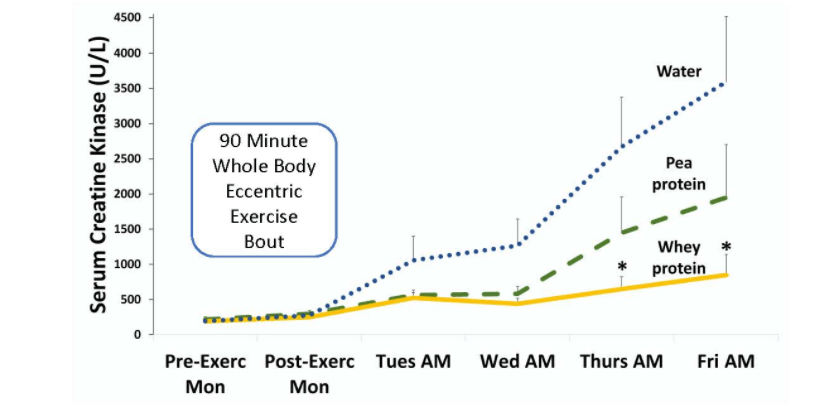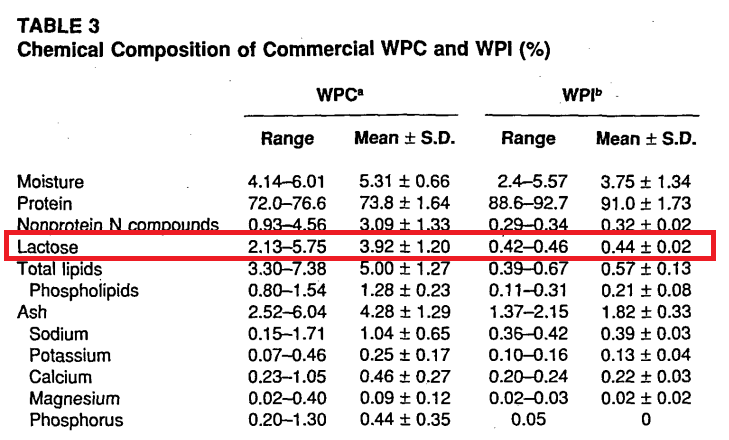Vegans don’t drink whey protein shakes, but is there any reason for you to buy vegan protein powder if you’re not vegan?
I’ve tested well over 30 plant-based protein powders at this point, so I feel like I’m somewhat qualified to answer this question.
This post is a head-to-head comparison of whey protein and the most common plant proteins used in powders (pea, hemp, brown rice). Everything is backed up with data or links to research whenever possible.
Table of Contents
Is Whey Protein Better Than Vegan Protein Powder?
Let’s start by examining the protein quality of these different protein sources.
Then we’ll look at studies that compare whey and plant proteins in subjects who work out.
Protein Content
No matter if you buy whey, pea, or brown rice protein powder, it’s almost always an isolate.
An isolate is extracted from its source in a way that extracts as much protein as possible, so whey and vegan protein powders have a similar amount of protein in them.
It varies quite a bit by brand. In my testing of plant-based protein powders, I saw shakes contain anywhere from 60-95% of calories from protein.
Here’s a direct comparison showing how similar a few top brands stack up:
| PlantFusion Vegan | ON Gold Standard Whey | |
|---|---|---|
| Calories | 120 | 120 |
| Protein (g) | 25 | 24 |
| Protein (Percent) | 83% | 80% |
You can see they’re essentially identical per serving.
Note that hemp protein powder has much less protein than whey (and more fiber instead). However, 90%+ of vegan protein powders are pea based (with a little rice or hemp protein mixed in), with similar macros to whey.
On average, both whey and vegan protein powders have a very similar amount of protein in them; both will increase your protein intake significantly.
Bioavailability
Not all protein is created equally. Our bodies can absorb a larger percentage of some than others, mostly based on their specific essential amino acids profile. This may affect muscle protein synthesis.
The best measure of protein quality is the Protein Digestibility Corrected Amino Acid Score (PDCAAS), where a score of 1 indicates a perfect score (1).
Let’s take a look at the PDCAAS of a few types of protein powder isolate:
| Source | PDCAAS |
|---|---|
| Whey | 1.0 |
| Soy protein | 1.0 |
| Pea protein isolate | 0.89 |
| Sacha Inchi Powder | 0.87 |
Soy protein is not common in vegan protein powders, but there are some that use it.
Sacha inchi is just a type of mountain peanut. It’s not common in protein powders and bars, but I’ve tried a few that have it.
Unfortunately it’s hard to find PDCAAS values for protein isolates. However, I expect that hemp is similar to pea protein since whole hemp seeds have a PDCAAS of 0.66, and peas have a score of 0.7.
Whey is considered among the highest quality protein isolate with a PDCAAS of 1.0. While it’s not a huge difference, it is more digestible than plant protein isolates.
Amino Acid Comparison
Just to give a little more detail on why whey protein powder has a high PDCAAS, we can compare the nine essential amino acids of each common protein isolate to a complete protein.
Note that different organizations have a different definition of what a complete protein is, so don’t get too hung up on the specific values. The values below for a complete protein are from the WHO (2):
| Amino Acid | Complete Protein (min %) | Hemp Protein (%) | Pea Protein (%) | Whey Protein (%) |
|---|---|---|---|---|
| Histidine | 1.5 | 2.7 | 2.5 | 1.7 |
| Isoleucine | 3.0 | 4.5 | 4.8 | 6.4 |
| Leucine | 5.9 | 6.8 | 8.5 | 10.6 |
| Lysine | 4.5 | 3.8 | 7.5 | 9.6 |
| Methionine+Cysteine | 2.2 | 4.6 | 1.9 | 4.4 |
| Phenylalanine+Tyrosine | 3 | 8 | 5.5 | 5.6 |
| Threonine | 2.3 | 3.9 | 3.7 | 6.7 |
| Valine | 3.9 | 5.6 | 5 | 5.9 |
Whey is clearly a complete protein with more than enough of all essential amino acids, but hemp is just a little low in lysine, while pea protein is a little low in methionine.
Being a complete protein isn’t that big of a deal (you’ll get those missing essential amino acids elsewhere throughout the day), but this is why many vegan protein powders have a combination of different protein sources.
While whey protein is a complete protein, most plant proteins are incomplete proteins. Both pea and hemp protein isolate are just shy of being complete proteins.
Is Vegan or Whey Better for Bodybuilding and Weight Loss? (Research)
Ultimately, you’re consuming protein powder to achieve some sort of benefit.
This is typically losing weight, gaining muscle, or just altering your physique in general.
There’s not a ton of research directly comparing whey to vegan protein powders, but there is some that I can summarize for you:
- A 12 week long study with 161 male subjects compared pea and whey protein powder supplementation and found no difference between the two groups (3).
- An 8 week study in male subjects found that brown rice protein consumed post-workout was just as effective as whey (4).
- One study tested whey vs plant-based protein powder taken before sleep after working out: “There were no significant differences between groups for any outcome measure.” (5).
- An 8 week study of protein powder and high intensity training concluded: “ingestion of whey and pea protein produce similar outcomes in measurements of body composition, muscle thickness, force production, WOD performance and strength” (6).
- A 5 day study on 92 non-obese males comparing pea and whey protein powder found that whey protein had the most significant effect on muscle damage recovery (7).
Most studies so far seem to show no huge difference, although the last short study did show that whey might be slightly more effective in certain situations.
But a lot more research needs to be done to conclude anything.
While research into this topic is still early, it appears that plant-based protein powders are just as effective as whey protein for recovery and building muscle.
Does Whey or Vegan Protein Powder Taste Better?
One thing that I know for sure from my time before going vegan is that whey protein supplements typically taste better than vegan ones.
With that being said, it varies a lot by brand, and the best tasting vegan protein powders taste just as good or better than the best whey powders.
While I’m speculating a bit, I think this explained by:
- Pea protein texture varies a lot depending on the manufacturer and brand. Usually it’s pretty chunky and chalky, but some have finer grains of powder that seem to have a better texture.
- Hemp protein isolate tastes pretty bad. I’ve bought it by itself a few times (no added ingredients), and had to add a lot of sweetener to make it edible.
Aside from the protein isolate, most of the taste will be dependent on sweeteners used (usually sugar or artificial sweeteners like stevia) and any other flavoring ingredients.
Some vegan protein powders taste like dirt, but the best ones taste just as good as any whey protein powder. You’ll just find more variation in plant-based powders, so you may need to try a few of them before you find one you like.
Whey Is More Likely To Cause Acne and Stomach Issues
For most people, whey protein causes no health issues at all.
However, I’ve seen a lot of anecdotal reports that whey protein gives them acne if they consume it on a regular basis.
The most likely explanation for this is the lactose in whey protein, as research shows that dairy intake is correlated to acne issues (8).
If you didn’t know, whey is derived from milk (i.e. an animal protein), and although it’s mostly just protein, there’s still some lactase (9). See the composition below of commercial whey (WPI = whey protein isolate, WPC = whey protein concentrate).
It’s under a percent of the total powder, but it’s still there.
Considering a lot of people are lactose intolerant, or just irritated by it, this could explain why some people get acne and stomach issues from consuming a lot of whey powder.
It’s not too common, but there is some that whey protein can cause acne and digestive issues. It varies from person to person, so it should just be something that is kept in mind.
Summary: Vegan vs Whey Protein
We’ve seen a few things here:
- Whey protein isolate is a higher quality protein if examined in isolation.
- Studies show that both vegan and whey protein powders are both effective when combined with resistance training.
- Vegan and whey protein appear to be essentially equally effective.
- Whey proteins generally taste better, but there are many good tasting vegan protein powders these days.
- Whey can cause acne and stomach problems in some people.
Overall, if you don’t have a dietary restriction whey protein and vegan protein will have an essentially identical effect on your weight loss or muscle building.
If you’re new to using a protein supplement, I would just say to try both and find one that you like the taste of. Make note of whether or not one of them gives you any skin or stomach issues.
If you’d like recommendations on a plant-based powder, see my guide to the best vegan protein powder.
References
- The Protein Digestibility-Corrected Amino Acid Score (PDCAAS)
- Protein and Amino Acid Requirements
- Pea proteins oral supplementation promotes muscle thickness gains during resistance training
- The effects of 8 weeks of whey or rice protein supplementation on body composition and exercise performance
- Effects of Pre-Sleep Whey vs. Plant-Based Protein Consumption on Muscle Recovery Following Damaging Morning Exercise
- The Effects of Whey vs. Pea Protein on Physical Adaptations Following 8-Weeks of High-Intensity Functional Training (HIFT): A Pilot Study
- Effects of Whey and Pea Protein Supplementation on Post-Eccentric Exercise Muscle Damage: A Randomized Trial
- Dairy Intake and Acne Vulgaris: A Systematic Review and Meta-Analysis of 78,529 Children, Adolescents, and Young Adults
- Whey protein concentrates and isolates


